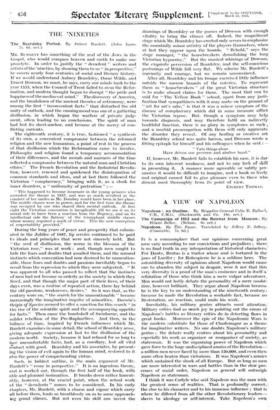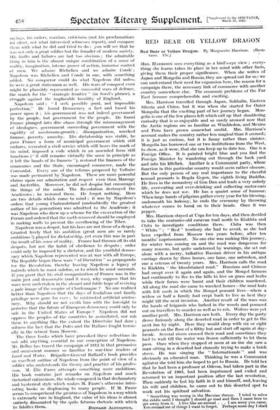A VIEW OF NAPOLEON
Napoleon : an Outline. By Brigadier-General Colin R. Ballard, C.B., C.M.G. (Duckworth and Co. 18s. net. ) - Napoleon. By Elie Faure. Translated by Jeffery E. Jeffery. (Constable. - 7s. 6d.) IT is a commonplace that our opinions concerning great men vary according to our convictions and prejudices ; there: is no final truth in any interpretation of historical characters.- For Dante, Brutus is a traitor whose soul is tortured in the- jaws of Lucifer ; for Robespierre he is a sublime hero. The
astonishing diversity of opinions about Napoleon would cause one to abandon the subject in despair, were it not that this very diversity is a proof of the man's eminence and in itself a
refutation of those who think him a mere vulgar adventurer, Men would not hotly debate the personality of a mere condot- tiere, however brilliant. They argue about Napoleon because . he is the key to an understanding of the nineteenth century, because he made the Revolution a workable fact, because no
Restoration, no reaction, could undo his work..
-Inevitably, • his military genius attracts most attention.'
Military critics find as much joy in pointing out the errors of Napolcon'S battles as literarycritics do in detecting flaws in great books. Moreover the epic of the Napoleonic Wars is the modern substitute for those of Charlemagne as a theme for imaginative writers. No one doubts Napoleon's military genius ; the debate really centres -about his personality and especially his work as organizer or reorganizer of society, as statesman. It was the organizing power of Napoleon which gave force to the huge undisciplined armies of the Revolution-- . a million men never faced by more than 150,000, and even then more often beaten than victorious. It was Napoleon's armies which sustained the shock of all Europe. But so long as men are more interested in wars and battles than in the sldw pro- cesses of social order, Napoleon as general will outweigh Napoleon as statesman.
I think it was Carlyle who-said Napoleon was the man with the greatest sense of realities. That is profoundly correct, the clue to his character and to his immense influence ; that is .
where he differed from all the other Revolutionary leaders— slaves to ideology or self-interest. Take Napoleon's own
sayings, his orders, maxims, criticisms (not_ his proclamations ler effect, not what interested witnesses report), and compare them with what he did and tried to do ; you will see that he
was not only a great soldier but the founder of modern society.
His faults and failures arc but too obvious ; the admirable thing in him is the almost unique combination of a sense of reality, imagination, intense power of action, immense control of men. We admire Richelieu and we admire Conde ; Napoleon was Richelieu and Conde in one, with something added. No conqueror could do what Napoleon did unless he were a great statesman as well. His wars of conquest even might be plausibly represented as successful wars of defence, the search for the " strategic frontier" (in Sorel's phrase), a struggle. against the implacable hostility of England.
Napoleon said : " I seek possible good, not impossible perfection." He found Democracy a fact and based his power upon it ; his government was not indeed government by the people, but government for the people. He found France plunged into dire chaos through the mismanagement of ideologues, government succeeding government with the rapidity of mushroom-growth ; disorganization, wrecked finance, poverty, anarchy. His dictatorship was stable, he gave France a form of municipal government which still
endures, recreated a civil service which still bears the mark of his mind, imposed a code which in an amended form -still
functions (" it still remains virtually the same in principle as it left the hands of its framers "), restored the finances of the communes and the State, encouraged commerce, made the Concordat.. Every one of the reforms. proposed by Voltaire was made permanent by Napoleon. These are more powerful claims upon our admiration and respect even than Marengo and Austerlitz. Moreover, he did not despise but encouraged the things of the mind. The Revolution destroyed the Academies ; he restored theni. He forgot nothing. Here are two details which come to mind ; it was by Napoleon's
orders that young Chateaubriand (undoubtedly the greatest author of his- generation) was admitted to the Academie ; it
was Napoleon who drew up a scheme for the excavation of the Fortin' and ordered that the earth removed should be employed in making walls to prevent the overflowing of the Tiber.1 Napoleon was a despot, but his laws are not those of a despot. Granted freely that his ambition (great men are so rarely ambitious !) played for dictatorship, yet even this was in part the result of his sense of reality. France had thrown off its old despots, but not the habit of obedience to despots ; order could only be imposed by a dictator, and the youthful democ- racy which Napoleon represented was at war with all Europe. The Republic began these wars " of liberation " as propaganda for the Revolution, thereby leaving Napoleon a legacy of hatreds which he must subdue, or to which he must succumb. If you grant that his civil reorganization of France was in the main just and democratic (and it was), why suppose that his wars were undertaken in the absurd and futile hope of reviving a pale image of the empire of Charlemagne ? No one realized better than Napoleon that the days of feudalism and family privilege were gone for ever ;. he mistrusted artificial aristoc- racy. Why should we not credit him with the foresight to perceive that the future of European democracy could only be safe in the United States of Europe ? Napoleon did not oppress the peoples of the countries he assimilated, nor rob them to anything like the extent the Directoire had done ; witness the fact that the Poles and the Italians fought heroic- ally in the retreat from Moscow.
The three books which have provoked these reflections do not add anything essential to our conception of Napoleon. Mr. Belloc has traced the campaign of 1812 in that persuasive and omniscient manner. so familiar to war-time readers of Land and Water. .1 Brigadier-General Ballard's book provides an excellent outline of Napoleon from the point of view of a soldier who understands the theory and practice of his profes- sion. M. Elie Faure attempts something more ambitious. His book contains just remarks on Napoleon and much rhetorical enthusiasm, the whole composed in that declamatory and hysterical style which makes M. Faure's otherwise inter- esting books so displeasing to many people. If M. Faure. seems to comprehend the greatness of Napoleon in a way which is extremely rare in England, the value of his ideas is- almost entirely discounted by the quite fatuous rhetoric with which























































 Previous page
Previous page